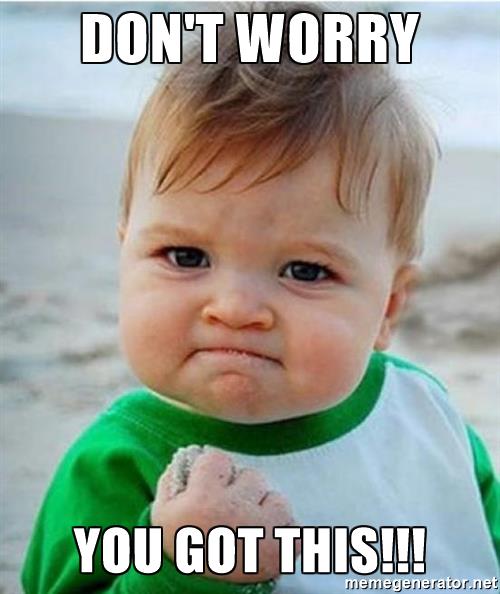Strength, Trust, and Mental Toughness
Pavel Tsatsouline has written a great post on the relationship between mental toughness and strength. In short, the phrase "mental toughness" usually conjures up images of endurance - a marathoner on mile 20+, a cyclist battling the steep climbs of the Tour de France, or a boxer surviving the late rounds. But Pavel argues that mental toughness is just as present during maximal expressions of strength.
And as someone who is notorious for my grind-it-out style of lifting - once performing an exhausting 14 second deadlift during a Tactical Strength Challenge - I conveniently fit Pavel's argument. :)
Sometimes all you need is to channel your inner Success Kid (OK, and maybe something else too)..
But I'd like to add to what Pavel has already written - mental toughness isn't only present during the attempt, it's most important before the attempt. In a sense, it's what goes on before the camera app is opened and Instagrams are posted.
When someone attempts a weight they're not yet ready for, they'll immediately start off on the wrong foot. No, not literally - although yes, sometimes that too. But their body language will show they're trying "not to fail" rather than trying to succeed. They lose trust in their strength before picking up a weight, leading them down a path of mistakes: rushing their set-up; rounding their back when they deadlift; elevating and shrugging their shoulders when they press; jumping or stepping off to initiate their pull-ups, rather than starting from a dead hang.
Instead, you must adopt not only mental toughness, but trust and a workmanlike attitude to be successful. These qualities don't come easily, as it's common to lose trust in yourself when you're worried about an injury or how the video will look when you post it to social media.
As such, these qualities can't be taught - they must be learned.
Below is one of my favorite examples from former client Sarah M. The video is one of the most impressive feats of strength I've ever witnessed and it only occurred through years of developing the proper confidence, trust, and attitude to approach a >50% bodyweight Turkish Get-Up. Sarah never came close to missing a get-up or dropping the bell in my years working with her, and we only increased the weight when the previous bell felt "easy." Her patience paid off as she makes the 36 kilo (80 lbs) kettlebell look smooth.
How does one develop this strength and trust? The sweet spot usually sits between 60-70% of your "max" weight. Of course, "max" is relative, but it should always feel closer to easy than hard. And failure should never be a possibility.
It's a lesson I learned firsthand when I failed my Beast Tamer attempt last year. My mind wasn't ready for me to press 106 pounds over my head - with one hand - because I hadn't developed the attitude to do so. I knew deep down I wasn't ready for The Beast, because I had never succeeded in my 4-5 attempts to press it previously. After taking a step back, grooving my technique (and my brain) with lighter weights, and not even touching the Beast for 8 months, this happened.
To paraphrase a famous Yogi Berra quote, 90% of lifting heavy things is mental. The other half is physical. And once in a while, you'll notice that mental toughness in the gym translates to other areas of life.
